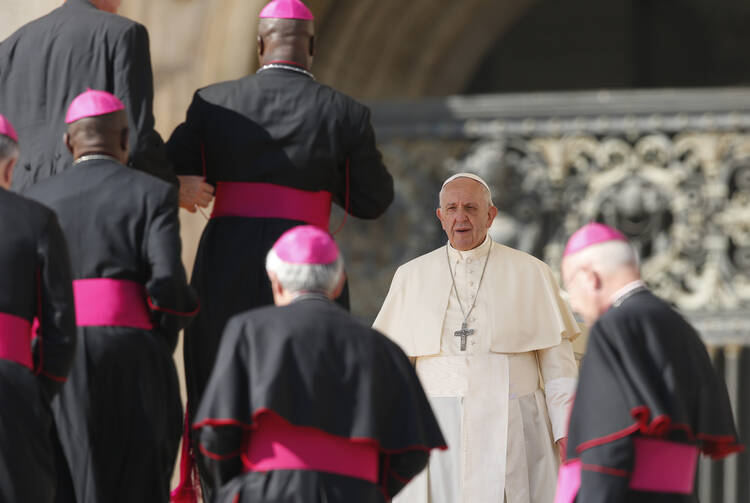VATICAN CITY (CNS) -- The Catholic Church's Code of Canon Law is an instrument that must serve the church's pastoral mission of bringing God's mercy to all and leading them to salvation, Pope Francis said.
Just as the first full codification of Catholic Church law was carried out 100 years ago "entirely dominated by pastoral concern," so today its amendments and application must provide for a well-ordered care of the Christian people, the pope said in a message Oct. 6 to a canon law conference in Rome.
Leading canonists, as well as professors and students from all the canon law faculties in Rome, were meeting Oct. 4-7 to mark the 100th anniversary of the first systematic Code of Canon Law, which was promulgated by Pope Benedict XV in 1917.
Work on the code began under the pontificate of St. Pius X and was a response not only to the need to examine, systematize and reconcile often conflicting church norms, Pope Francis said. After the Vatican lost its temporal power, he said, St. Pius knew it was time to move from "a canon law contaminated by elements of temporality to a canon law more conforming to the spiritual mission of the church."
Pope Francis: The 100th anniversary of the Code of Canon Law should be a time to recognize the importance of canon law as a service to the church
The 100th anniversary of the code, which was updated by St. John Paul II in 1983, should be a time to recognize the importance of canon law as a service to the church, Pope Francis said.
When St. John Paul promulgated the new law, the pope said, he wrote that it was the result of an effort "to translate into canonical language ... the conciliar ecclesiology," that is, the Second Vatican Council's vision of the church, its structure and relation to its members and the world.
"The affirmation expresses the change that, after the Second Vatican Council, marked the passage from an ecclesiology modeled on canon law to a canon law conforming to ecclesiology," Pope Francis said.
The church's law must always be perfected to better serve the church's mission and the daily lives of the faithful
The church's law must always be perfected to better serve the church's mission and the daily lives of the faithful, which, he said, was the point of his amendments to canon law streamlining the church's process for determining the nullity of a marriage.
Canon law, he said, can and should be an instrument for implementing the vision of the Second Vatican Council.
In particular, Pope Francis said, it should promote "collegiality; synodality in the governance of the church; valuing particular churches; the responsibility of all the Christian faithful in the mission of the church; ecumenism; mercy and closeness as the primary pastoral principle; individual, collective and institutional religious freedom; a healthy and positive secularism; (and) healthy collaboration between the church and civil society in its various expressions."










